Poisonous plants in the house and garden
Posted in Healthy Home & Garden on April 12, 2014. Last modified on April 21, 2019. Read disclaimer.
Plants are all around us. Fortunately, 98% of these plants are NOT poisonous. However, families with small children should be aware that a few plants can be hazardous if ingested. According to emergency room reports, the greatest danger to children from eating plants is choking, not poisoning. Older children and adults should be reminded not to eat any plant or plant part not normally considered a food without researching its safety.
+ Free Shipping & Returns on Eligible Items.
(*Amazon's Top 100 list updated hourly.)
Although some plants can cause illness, few plants are toxic enough to be fatal. Except for a very few highly toxic plants, fatalities usually result only from large doses or allergic reactions. The extent of illness depends on the amount ingested, the sensitivity of the individual to the particular toxin, and the age of the individual. Symptoms of poisoning can vary greatly from one individual to another. Also note that plants that have traditionally been used as herbal remedies can be toxic if not prepared correctly or if too much is taken.
What to do if you suspect someone has become ill from eating a poisonous plant:
Don't panic.
Seek medical attention as soon as possible.
ALWAYS take along a sample (more than one, if possible) of the FULL plant (including root) so the doctor or hospital can identify the actual problem and appropriate treatment can be administered quickly. Place sample in a paper (not plastic) bag, box or cup to prevent from being crushed.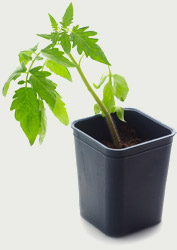
If the person has vomited, collect as much as possible to aid doctor in identifying the poison.
Three items should always be available in case of any type of poisoning:
- Phone number for a poison control center:
- WNC Poison Control: 1-800-542-4225
- Carolinas Poison Center: 1-800-848-6946
- syrup of ipecac *
- activated charcoal *
* Use only under advice of physician. Syrup of ipecac is usually effective only when administered to someone with a full stomach and who is moving about. Never administer any medication by mouth to an unconscious person.
The following is a partial list of the poisonous plants which may be found around homes, landscapes, and natural areas in Western North Carolina. It is not intended to be an all-inclusive list of all known toxic plants or all the possible symptoms that can be caused by these plants.
| HOUSE PLANTS | TOXIC PART | SYMPTOMS |
|---|---|---|
| Amaryllis | bulb | vomiting, diarrhea |
| Calla lily | all | mouth irritation |
| Dumbcane | all | mouth & throat irritation & swelling, nausea |
| Eucalyptus | leaves | vomiting, diarrhea, paralysis, possible death |
| Fishtail palm | all | mouth & throat irritation & swelling |
| Jerusalem Cherry | leaves, berries | vomiting, weakness, death possible |
| Mistletoe | berries | vomiting, diarrhea, death possible from large doses |
| Pathos, Devil's Ivy | all | mouth & throat irritation & swelling |
| Peace Lily | all | mouth & throat irritation & swelling |
| Philodendron | all | mouth & throat irritation & swelling, nausea |
| Poinsettia | milky sap | skin irritation |
| Rubber plant | milky sap | skin irritation |
| Schfflera, Umbrella plant | all | mouth & throat irritation & swelling, nausea |
| VEGETABLES | TOXIC PART | SYMPTOMS |
|---|---|---|
| Potato | green potato skins, sprouts | vomiting, diarrhea, death possible from large doses |
| Rhubarb | leaves | vomiting, kidney damage |
| Tomato | leaves, stems | vomiting, weakness |
NEXT: Poisonous flowers, trees and other yard plants | Poisonous wild plants in North Carolina
Sources: Potentially Poisonous Plants in the Home and Landscape, Linda G. Blue, Extension Agent, Agriculture - Urban Horticulture, North Carolina Cooperative Extension, Buncombe County Center

 How to prepare if you have pets and are going to have a baby
How to prepare if you have pets and are going to have a baby Tips for battling afternoon fatigue
Tips for battling afternoon fatigue Organic Gardening infographic
Organic Gardening infographic Tools for determining your risk of disease
Tools for determining your risk of disease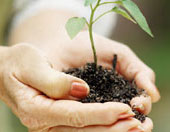 Getting a jumpstart on spring gardening
Getting a jumpstart on spring gardening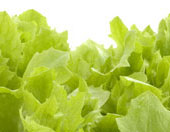 Fall gardening tips and tricks
Fall gardening tips and tricks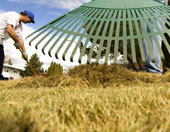 Composting kitchen and yard scraps
Composting kitchen and yard scraps How music and laughter can effect our health
How music and laughter can effect our health Simple to build, Do It Yourself standup desk
Simple to build, Do It Yourself standup desk Steps for keeping your eyesight healthy as you age
Steps for keeping your eyesight healthy as you age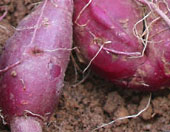 Guide to growing purple sweet potatoes
Guide to growing purple sweet potatoes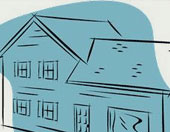 What's radon in the home and why should I be concerned
What's radon in the home and why should I be concerned Simple and healthy smoothie recipes
Simple and healthy smoothie recipes What you can do to keep your Immune System strong
What you can do to keep your Immune System strong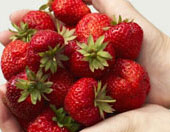 Gardener's guide to growing strawberries
Gardener's guide to growing strawberries Causes of stress and how to deal with it
Causes of stress and how to deal with it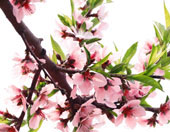 Poisonous plants in your home and garden
Poisonous plants in your home and garden